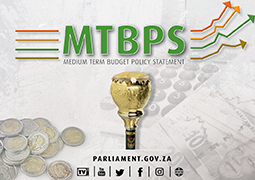
The Minister of Finance Mr Enoch Godongwana will tomorrow present the Medium Term Budget Policy Statement (MTBPS) in a sitting of the National Assembly (NA) at the Cape Town City Hall.
The minister will also introduce the Division of Revenue Amendment Bill, the Adjustment Appropriation Bill, Rates and Monetary Amounts and Amendment of Revenue Laws Bill and the Taxation Laws Amendment Bill.
The MTBPS sets, among other things, government’s policy goals and priorities, forecasts the macroeconomic trajectory and projects the fiscal framework over the next three years by outlining spending and revenue estimates.
According to the Parliamentary Budget Office, the MTBPS also provides an update on government finances and the economic status of the country, such as changes to spending and revenue collection. The MTBPS also makes changes to expenditure estimates on unforeseen, emergency and reprioritisation.
The National Treasury website defines the MTBPS as a Cabinet policy statement tabled in Parliament about three months before the annual budget, which sets out the economic context and assumptions that inform the following year’s budget, as well as the framework in which the budget is prepared.
Also, according to the National Treasury the budget framework consists of the fiscal framework, government spending priorities, the division of resources between national, provincial and local government, and a tabulation of the major conditional grants. The budget framework enables national departments, provinces and municipalities to prepare their detailed budgets for the following year.
South Africa has a multi-year budgeting process, so the framework covers the present year and the three subsequent years. The fiscal framework sets out government’s revenue projections, spending estimates, borrowing requirements and assumptions concerning debt interest costs over the period.
The medium-term expenditure framework is government’s broad three-year spending plan. The MTBPS also provides a report on spending for the first six months of the fiscal year in which it is tabled. Parliament plays a critical role in the budget process and is responsible for approving all appropriations, following any amendments. Government departments can only spend money that is appropriated by Parliament for a specific purpose. Parliament conducts public hearings on the MTBPS.
On Thursday the Minister of Finance will appear before a joint meeting of the NA’s Standing Committee on Finance and Standing Committee on Appropriations as well as the National Council of Provinces’ Select Committee on Finance and Select Committee on Appropriations, for further deliberations on the MTBPS, and the committees will thereafter conduct public hearings on the policy statement.
These hearings cover the economic forecasts, the fiscal framework, revenue assumptions, spending priorities and the division of revenue. Section 6 of the Money Bill Amendment Procedure and Related Matters Bill regulates the process by which the MTBPS is processed in the legislature. Parliament can recommend changes to the division of revenue.
The Division of Revenue Bill seeks to provide for the equitable division of revenue raised nationally among the national, provincial and local spheres of government, the determination of each province’s equitable share; allocations to provinces, local government and municipalities from national government’s equitable share.
The PBO assists Members of Parliament with the implementation of the Money Bills and Related Matters Act, in particular the Finance and Appropriations Committees of both Houses of Parliament as well as other committees, subject to availability.
By Sakhile Mokoena
25 October 2022

